Tony Evers won reelection as governor by an unusually large margin for a top-of-the-ticket November election in Wisconsin. He received 51.1% of the vote, compared to 47.8% for his challenger, Republican Tim Michels.
Simultaneously, Republican Senator Ron Johnson was also reelected, albeit more narrowly. Johnson won 50.4% of the vote, while his Democratic challenger Mandela Barnes took 49.4%.
Expressed in margin terms, the outcome of the governor’s race was a 3.4-point Democratic victory, and the outcome of the senate race was a 1.0-point Republican win, meaning the two races saw a net spread of 4.4 points. That’s no small thing in a state as narrowly divided as Wisconsin, where the 2000, 2004, 2016, and 2020 presidential races were all decided by less than 1 point. (In fact, the last two presidential candidates to actually win a majority of the vote are Barack Obama and Michael Dukakis.)
Many observers were surprised by this gap between Evers and Barnes—the two most prominent statewide Democratic candidates. Some suggested that a wave of racist attack ads accounted for Barnes’ narrow loss. Certainly, publicly available polling showed a marked decline in support for Barnes between the primary and the general election, consistent with the timing of the anti-Barnes advertising blitz.
Still, after comparing the two marquee races to everything else on the ballot, it’s clear that Barnes’ performance isn’t unusual. Instead, Evers’ strong performance and the enduring significance of incumbency advantage are what stand out.

Not a single incumbent lost in November 2022, out of the 90 running. That includes the 10 state senate, 76 state assembly, and 4 statewide officers seeking reelection.
Elsewhere, I have modeled the advantage provided by incumbency in contested state assembly races. I found that incumbency is worth about 4 points at the margin. In other words, in a race that we’d otherwise expect to be 50/50, an incumbent candidate will probably win 52% of the vote. Democratic and Republican incumbents benefit equally.
I don’t expect incumbency advantage to be the same size in statewide races, because they generally feature better known and funded challengers. Still, given the pattern in Assembly races, it’s no surprise that incumbents also seem to benefit statewide.
The graph below compares the vote for US Senator (y-axis) with the votes for each other statewide office (x-axes). Each dot represents a reporting unit—the smallest unit for which election data is available. If a dot lies above the diagonal orange line, it means that Mandela Barnes did better than the Democrat in the comparison race. If the dot is below the orange line, it means Barnes received a smaller share of the vote.
In each case, the votes are highly correlated, but some patterns are still evident. Barnes did noticeably worse than Evers and slightly worse than Attorney General Josh Kaul or Secretary of State Doug LaFollette. On the other hand, Barnes received a nearly identical share of the vote as the Democratic candidate in the open race for State Treasurer. In each case, a direct linear relationship is apparent. Barnes did about as well, relative to the comparison Democrat, in solidly red, competitive, and firmly blue neighborhoods.

The next set of graphs compares Barnes performance with Democratic Assembly candidates in different incumbent scenarios. Barnes generally did slightly better than Democratic Assembly candidates running against Republican incumbents. He generally fared slightly worse than incumbent Democrats. And he performed nearly identically to Assembly Democratic candidates in open races.

When benchmarked against the other Democratic candidates on the ballot, Mandela Barnes’ 2022 senate campaign no longer looks unusual. If anything, he might have performed slightly better than expected. Despite facing a Republican incumbent, he ran basically as well as other Democrats in open races.
Incumbency effects aren’t large, but in a narrowly divided state like Wisconsin, they can make the difference between winning and losing.
Map Supplement
The following maps show the difference between Barnes performance and various other Democrats in each reporting unit used in the November 2022 election. Purple indicates that Barnes got less of the vote than the other Democrat. Green indicates that Barnes performed better.
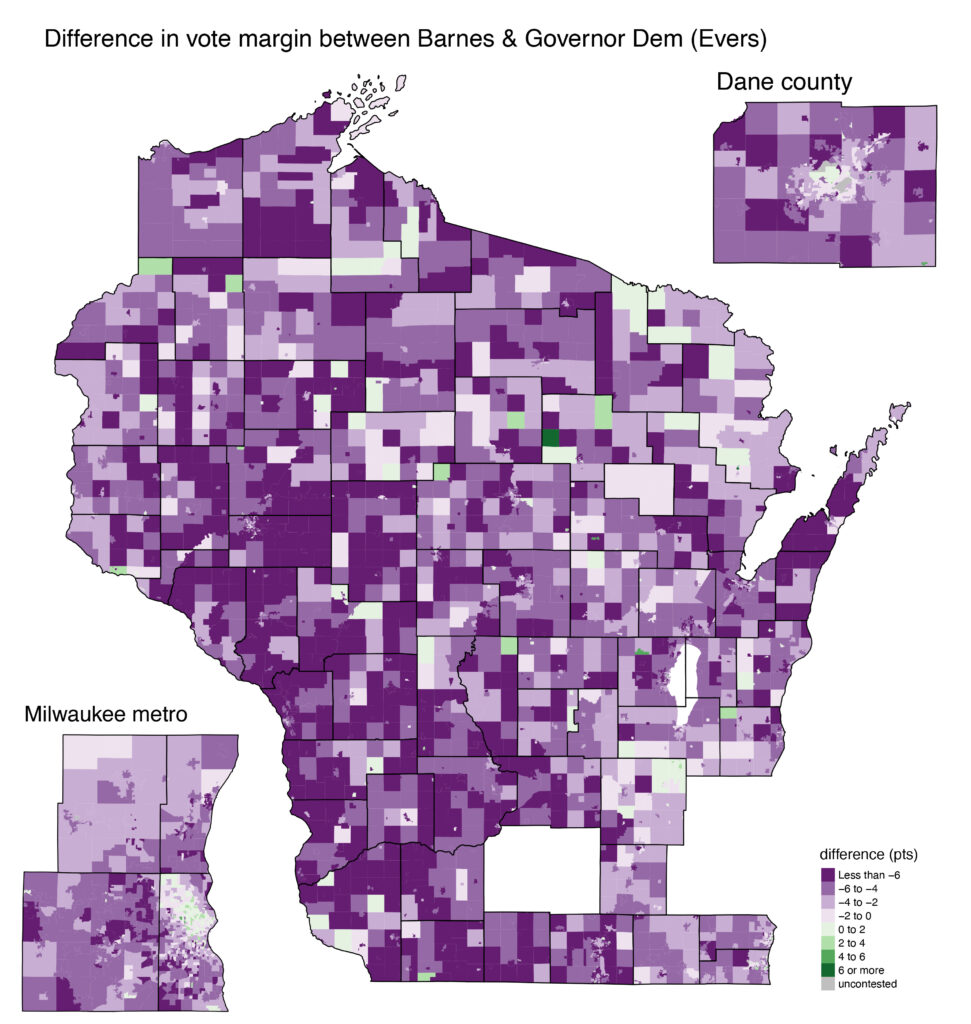
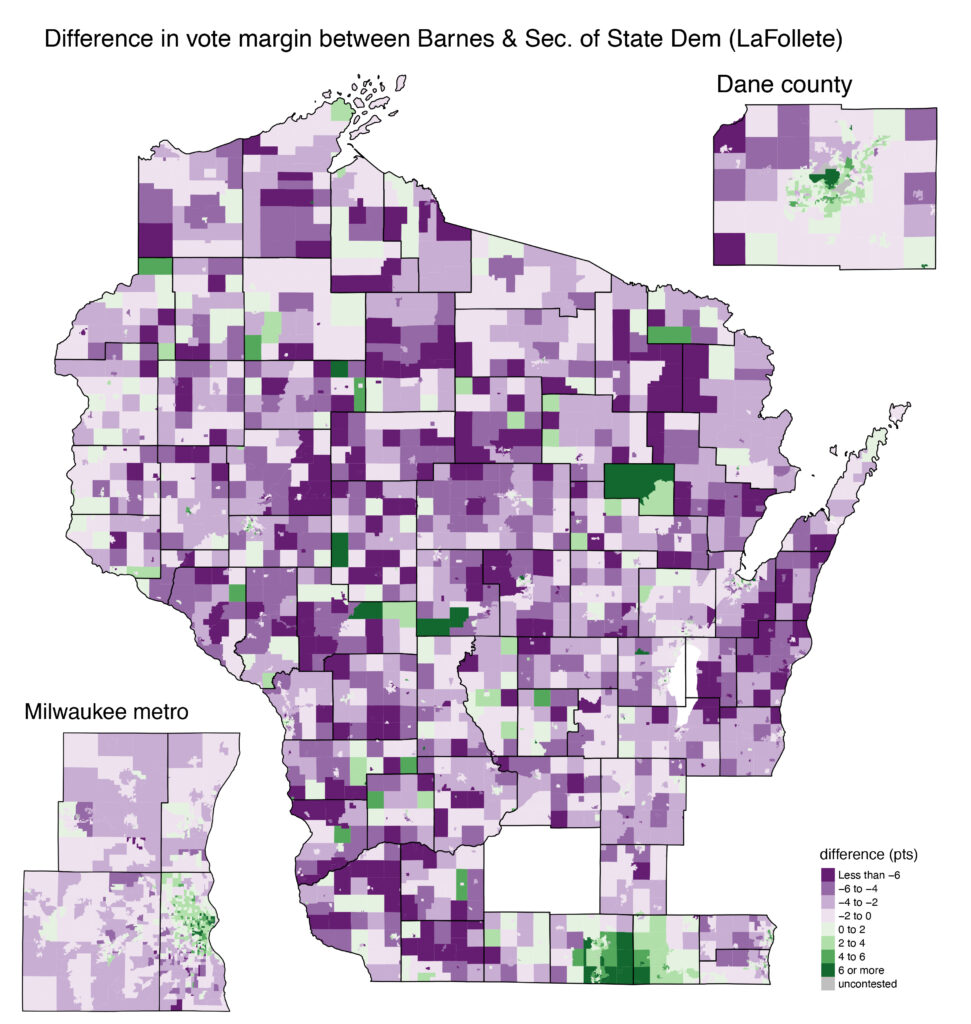
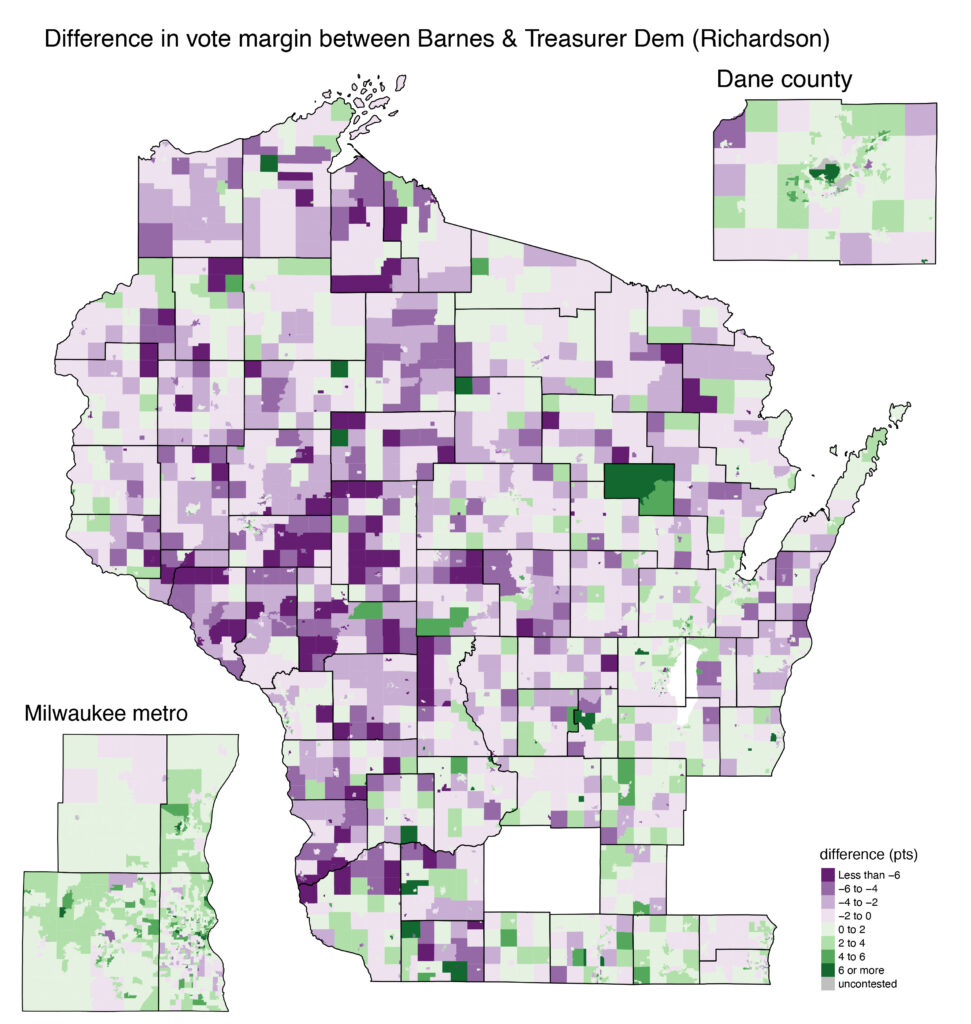
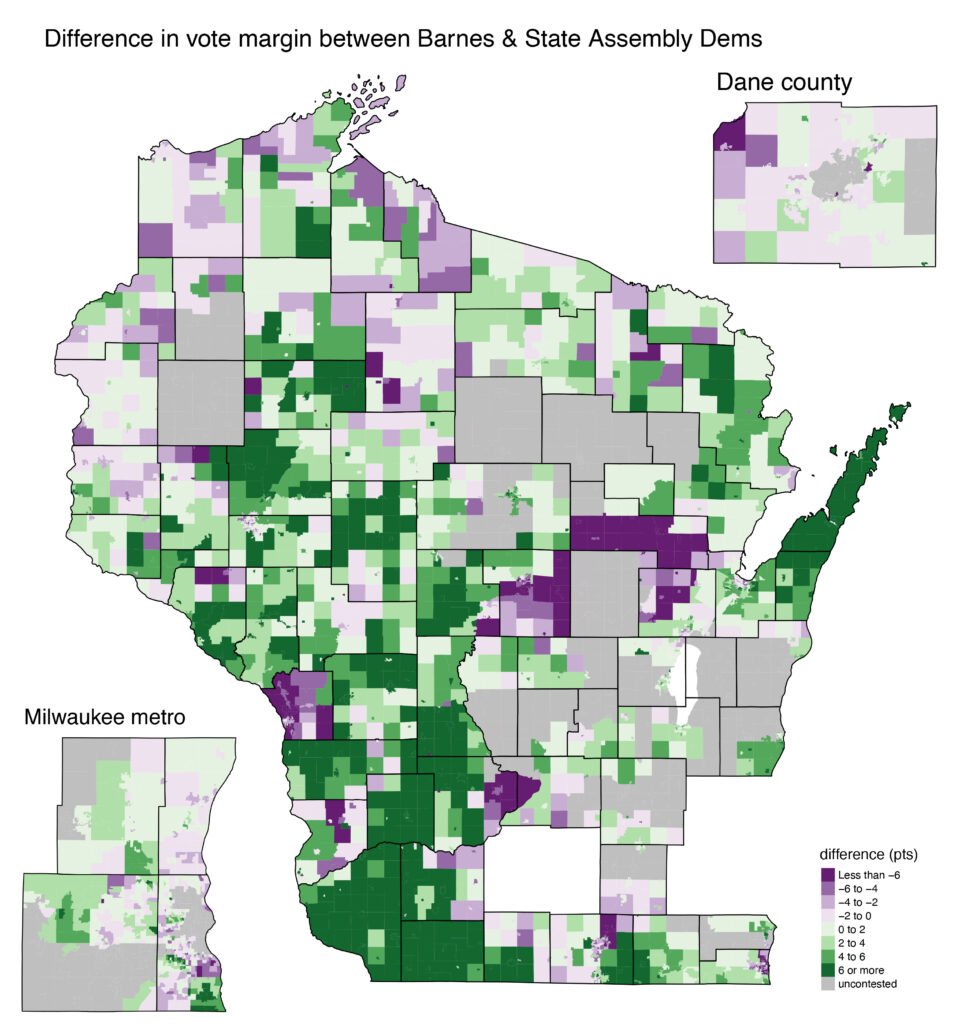
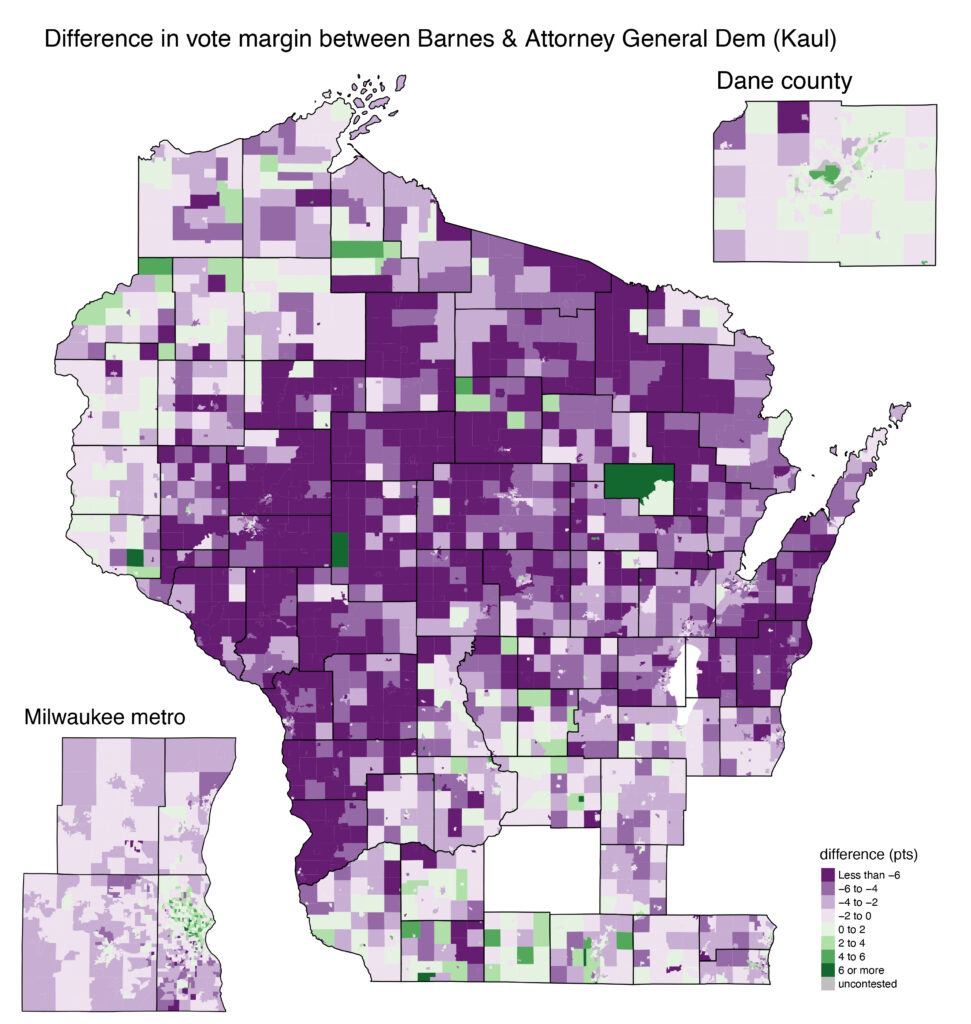

I have other reasons for this. They all involve the “human factor,” as in if you upset people it will cost you an election. I was here in Milwaukee for all of the events I describe and they are based on my observations of my friends in this neighborhood as they happened.
First, Barnes attitude when exposed for not paying his property taxes was to lash out at those who inquired and then make it seem like he was being treated unfairly. Pretty much any homeowner will tell you how much they hate paying city property taxes But they do it and do it on time. It was a slap in the face.
Second was the same kind of thing thing but with unpaid tickets. Barnes came back with the same lousy attitude.
Third. There was the “I have a college degree” when he did not. I nearly killed myself getting my B.S. Wisconsin people like those who play fair, do not complain when they fail to do something everyone else has to do and they do not like people who lie about having a college degree when they do not. That is how Judge Janet connected with them all over the state. She showed them she was one of them. Barnes did not and it had nothing to do with skin color.